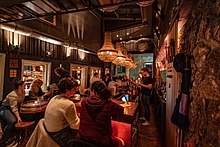pub

The pub is a restaurant that mainly serves the consumption of beer , but also other alcoholic and non-alcoholic drinks .
More formal, but seldom used terms for “pub” are “local”, “ Schänke ” (or “Schenke”), “ Taverne ”, Spund / Spunten or “Schankwirtschaft” as opposed to “ Speisewirtschaft ” ( restaurant ). Since small dishes or snacks are often offered in pubs , the boundary to the restaurant is fluid.
etymology

As early as 1781 Christian Wilhelm Kindleben used the name “pub” for “a beer tavern” . Augustin already speaks of an “inn” in his “Idiotikon der Burschenssprache” (1791). Around the middle of the 19th century, the word was used in the student pub as a Germanization of the previously used Kommerses in the student language. C. B von Ragotzky wrote his work "Der brotte Bursch" in 1831, in which the explanation of "pub" corresponds to its current meaning: "pub is generally called every inn [...]".
The name is an abbreviation of the term Kneipschenke, which already existed in the 18th century. These were rooms that were so narrow that the guests had to sit huddled together. Located in the Central German occupied verb pubs for "squeeze" is a loan word from the Middle Low German word knīpen (see. The modern Low German form kniepen ) equipped with high German pinch urverwandt is.
The phrase "go on a pub crawl" refers to visiting several bars one after the other with corresponding alcohol consumption. It is sometimes assumed that the guest was thrown out of a pub because he was drunk or because he could not pay and therefore goes to another.
Other names
In Austria there is the name Beisl , in German-speaking Switzerland Beiz (more neutral), Spunten or Knelle (derogatory), in Old Bavaria Boazn and partly in Baden-Württemberg Boitz . These names are derived from the Yiddish bajis for house ( Hebrew beijt ).
In Upper Lusatia, the Sorbian word Kretscham is used. Pinte is common in the Ruhr area .
Schänke refers to the bar as the main characteristic of a pub.
As Bumslokal or Bums (e) ( Austrian. : Bums'n even Rumms'n ) is a pub "dubious nature" refers to a loud dance music, no disco is. The expressions " Spelunke" and " Kaschemme" for a shabby pub are derogatory.
Establishment and operation
Typical for pubs is the serving of draft beer at the counter , at which guests can often sit. There are more tables and chairs in the guest room . Sometimes the establishment of a pub also includes play equipment such as pool tables , table football , dartboards , pinball machines or slot machines . Many pubs also have televisions in which, for example, football matches are shown publicly. In some pubs there is a savings cabinet , in which members of local savings clubs regularly put cash. Pubs often serve as meeting places of other clubs that there a regular Stammtisch hold, sometimes, therefore, find in the pubs and objects that belong to these associations or refer to their activities such as company banners or trophies. Some pubs also have a separate room or hall that is separated from the actual dining room and can be rented out for club meetings or family celebrations.
The operator of a pub is the host or bartender [kneipi̯eː] or Kneiper called, often are still waiters hired. The opening times of pubs are regulated by the locally applicable curfew .
Pub deaths


For years there has been a tendency towards a steady decline in the number of pubs and traditional restaurants. The front runner when it comes to pub deaths is Hamburg, where the number of restaurants fell by 48.1 percent between 2001 and 2010, followed by Lower Saxony with a loss of 41.2 percent. There are several reasons for this: people drink less beer, poor people earn less money and young people spend their free time differently.
Nationwide, the number of pubs fell from just under 36,700 to around 31,100 between 2009 and 2015.
There is no discernible connection between the death of pubs and the protection of non-smokers ; Both in Hamburg and in Lower Saxony there is an exception to the law that permits smoking in pubs with an area of up to 75 m² throughout the establishment. In the Free State of Bavaria, which has a general smoking ban in pubs, only 24.5 percent of the pubs closed in the same period.
See also
literature
- Franz Dröge, Thomas Krämer-Badoni: The pub. On the sociology of a cultural form or "Two halves on me!" Frankfurt 1987, ISBN 3-518-11380-1 .
- Björn Kuhligk, Tom Schulz (ed.): The Berlin pub book. Berlin 2006.
- Jörg Rössel , Michael Hölscher: Social milieus in restaurants: An observation. In: Sociologus 54, 2004, pp. 173-203.
- Gudrun Schwibbe (Ed.): Pub culture. Investigations around the counter. Munster 1998.
- Georg Wedemeyer: Pub & Political Culture . Centaurus-Verlagsgesellschaft, Pfaffenweiler 1990, ISBN 3-89085-420-6 .
Web links
- Between thought of revolution and dignified intoxication , Berliner Stadtzeitung Scheinschlag, Issue 2, 2005, last accessed on May 31, 2012
Individual evidence
- ↑ Etymological dictionary of the German language . 24th edition, p. 503, ISBN 978-3-11-017473-1
- ↑ Wissen.de: Explanation of the word Pinte. August 18, 2018. Retrieved August 18, 2018 .
- ↑ dtv-Lexikon, February 1976, ISBN 3-423-03053-4 , Volume 3, p. 18
- ↑ " Bar dying. Number of restaurants down by 48 percent ”, WELT online from April 9, 2012, last accessed on May 31, 2012
- ^ Frankfurter Allgemeine Zeitung GmbH: Village life: the classic inn is dying out. September 18, 2017. Retrieved September 18, 2017 .